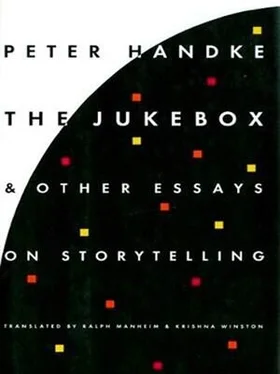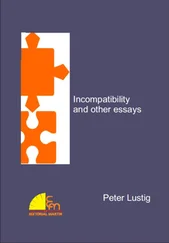Unlike with the field huts, he was not satisfied to have the jukeboxes simply stand there; they had to be ready to play, quietly humming — even better than having just been set in motion by a stranger’s hand — lit up as brightly as possible, as if from their inner depths; there was nothing more mournful than a dark, cold, obsolete metal box, possibly even shamefacedly hidden from view under a crocheted Alpine throw. Yet that did not quite correspond to the facts, for he now recalled a defective jukebox in the Japanese temple site of Nikko, the first one encountered in that country after a long journey between south and north, hidden under bundles of magazines, the coin slot covered over with a strip of tape and promptly uncovered by him — but at any rate there, at last. To celebrate this find he had drunk another sake and let the train to Tokyo out there in the darkness depart without him. Before that, at an abandoned temple site way up in the woods, he had passed a still smoldering peat fire, next to it a birch broom and a mound of snow, and farther along in the mountainous terrain a boulder had poked out of a brook, and as the water shot over it, it had sounded just like the water in a certain other rocky-mountain brook — as if one were receiving, if one’s ears were open to it, the broadcast of a half-sung, half-drummed speech before the plenary session of the united nations of a planet far off in the universe. Then, at night in Tokyo, people had stepped over others lying every which way on the railroad steps, and even later, again in a temple precinct, a drunk had stopped before the incense burner, had prayed, and then staggered off into the darkness.
It was not only the belly resonance: the “American hits” had also sounded entirely different to him back then on the jukeboxes of his native land than on the radio in his house. He always wanted the radio volume turned up when Paul Anka sang his “Diana,” Dion his “Sweet Little Sheila,” and Ricky Nelson his “Gypsy Woman,” but at the same time he felt guilty that such non-music appealed to him (later, when he was at the university and finally had a record player in his room, with the radio as an amplifier, for the first few years it was reserved for what was conventionally felt to deserve the name of music). But from the jukebox he boldly unleashed the trills, howls, shouts, rattling, and booming that not merely gave him pleasure but filled him with shudders of rapture, warmth, and fellowship. In the reverberating steel-guitar ride of “Apache,” the cold, stale, and belch-filled Espresso Bar on the highway from the “City of the Plebiscite of 1920” to the”City of the Popular Uprising of 1938” got plugged into an entirely different kind of electricity, with which one could choose, on the glowing scale at hip-level, numbers from “Memphis, Tennessee,” felt oneself turning into the mysterious “handsome stranger,” and heard the rumbling and squeaking of the trucks outside transformed into the steady roar of a convoy on “Route 66,” with the thought: No matter where to — just out of here!
Although back home the music boxes had also been a gathering point for Saturday-night dances — a large semicircle around them was usually left clear — he himself would never have thought of joining in. He did enjoy watching the dancers, who in the dimness of the cafés became mere outlines around the massive illuminated case whose rumble seemed to come out of the ground — but for him a jukebox, like the field huts earlier, was a source of peace, or something that made one feel peaceful, made one sit still, in relative motionlessness or breathlessness, interrupted only by the measured, positively ceremonial act of “going to push the buttons.” And in listening to a jukebox he was never beside himself, or feverish, or dreamy, as he otherwise was with music that affected him — even strictly classical music, and the seemingly rapturous music of earlier, preceding eras. The dangerous part about listening to music, someone had once told him, was the propensity it had to make one perceive something that remained to be done as already done. The jukebox sound of his early years, on the other hand, literally caused him to collect himself, and awakened, or activated, his images of what might be possible and encouraged him to contemplate them.
The places where one could mull things over as nowhere else sometimes became, during his years at the university, places of evasion, comparable to movie theaters; yet, while he tended to sneak into the latter, he would enter his various jukebox cafés in a more carefree manner, telling himself that these proven places of self-reflection were also the right places for studying. This turned out to be a delusion, for once he was alone again, for instance before bedtime, and tried to review the material he had gone over in such a public setting, as a rule he had not retained much. What he owed to those niches or hideouts during the cold years of his university studies were experiences that he now, in the process of writing about them, could only characterize as “wonderful.” One evening in late winter he was sitting in one of his trusty jukebox cafés, underlining a text all the more heavily the less he was taking it in. This café was in a rather untypical location for such places, at the edge of the city park, and its glass display cases with pastries and its marble-topped tables were also incongruous. The box was playing, but he was waiting as usual for the songs he had selected; only then was it right. Suddenly, after the pause between records, which, along with those noises — clicking, a whirring sound of searching back and forth through the belly of the device, snapping, swinging into place, a crackle before the first measure — constituted the essence of the jukebox, as it were, a kind of music came swelling out of the depths that made him experience, for the first time in his life, as later only in moments of love, what is technically referred to as “levitation,” and which he himself, more than a quarter of a century later, would call — what? “epiphany”? “ecstasy”? “fusing with the world”? Or thus: “That — this song, this sound — is now me; with these voices; these harmonies, I have become, as never before in life, who I am: as this song is, so am I, complete!”? (As usual there was an expression for it, but as usual it was not quite the same thing: “He became one with the music.”)
Without at first wanting to know the identity of the group whose voices, carried by the guitars, streamed forth singly, in counterpoint, and finally in unison — previously he had preferred soloists on jukeboxes — he was simply filled with amazement. In the following weeks, too, when he went to the place every day for hours, to sit surrounded by this big yet so frivolous sound that he let the other patrons offer him, he remained in a state of amazement devoid of name-curiosity. (Imperceptibly the music box had become the hub of the Park Café, where previously the most prominent sound had been the rattle of newspaper holders, and the only records that were played, over and over, were the two by that no-name group.) But then, when he discovered one day, during his now infrequent listening to the radio, what that choir of sassy angelic tongues was called, who, with their devil-may-care bellowing of “I Want to Hold Your Hand,” “Love Me Do,” “Roll Over, Beethoven,” lifted all the weight in the world from his shoulders, these became the first “non-serious” records he bought (subsequently he bought hardly any other kind), and then in the café with columns he was the one who kept pushing the same buttons for “I Saw Her Standing There” (on the jukebox, of course) and “Things We Said Today” (by now without looking, the numbers and letters more firmly fixed in his head than the Ten Commandments), until one day the wrong songs, spurious voices, came nattering out: the management had left the old label and slipped in the “current hit,” in German … And to this day, he thought, with the sound of the early Beatles in his ear, coming from that Wurlitzer surrounded by the trees in the park: when would the world see such loveliness again?
Читать дальше












